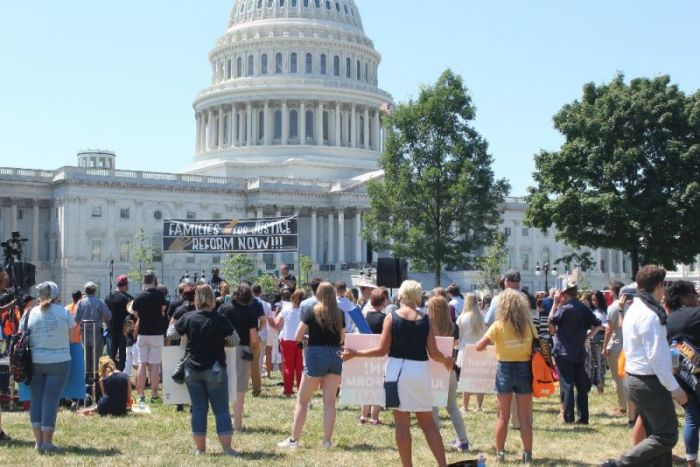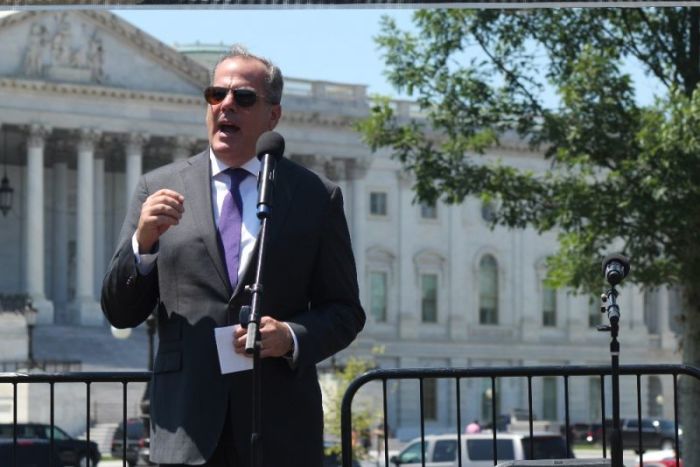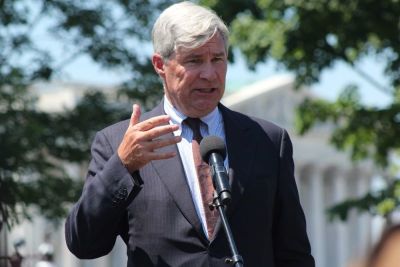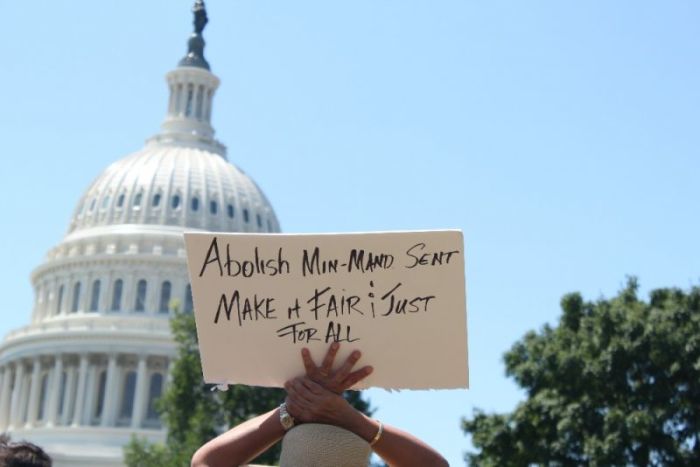Family Members of Inmates Lobby Senators to Pass Prison Fellowship-Backed Reform Bill
Activists Confident They Have the Votes to Pass FIRST STEP Act

WASHINGTON — Dozens of family members of incarcerated inmates in federal prisons are meeting with nearly half of the United States Senate on Wednesday to urge them to vote in support of a Trump-backed prison reform bill that overwhelming passed in the House but has stalled in the upper chamber.
As criminal justice reform activists say that the best chance in decades to pass meaningful prison reform legislation that will help reduce the federal recidivism rate is now, activists and family members held a rally outside of the U.S. Capitol on Tuesday to publicly voice their call for the Senate to vote on and pass the bipartisan FIRST STEP Act.
The FIRST STEP Act would greatly expand the training and educational programs that are available for federal inmates to help prepare them for life outside of prison and allow those eligible to earn time credits to complete their sentences in halfway homes or in-home confinement. The legislation would also do other things like ban the shackling of pregnant inmates in labor and place a 500-mile limit on how far inmates can be incarcerated from their families.
Although 134 Democratic Congress members voted in favor of the bill when it passed 360-59, it has not been voted on in the Senate and has also been opposed by over 70 left-leaning social justice groups that want the bill to include mandatory minimum sentencing reform for non-violent drug offenders.
At the rally hosted by the nonprofit Families Against Mandatory Minimums, several family members spoke about their experiences and how the FIRST STEP Act would not only benefit their imprisoned loved ones but would also benefit them as well.
Although the bill does not include mandatory sentencing, the message at the rally was clear: inmates in federal prison and their families can not wait any longer for Congress to fix a broken prison system simply because a bill doesn't have all the things that politicians desire.
Tony Lewis Jr., a re-entry specialist based in D.C. whose father has served over 29 years in federal prison, shared how much of a struggle it was for him growing up in the nation's capital with his father all the way across the country in California for the first 13 years of his sentence.
"In terms of this bill, I think it is important to keep people within a 500 mile radius," he said. "Those familial bonds are some of the most important things to keep people through. I like to tell people, particularly young people, you are the driving force in your parents' life."
Now that he is working as a professional helping inmates successfully re-enter society, Lewis said that the FIRST STEP Act would provide immense help in fixing the "skill set deficit" that currently exists in federal prisons.
"Everybody does their time in the federal system and there is a big skill set deficit," he said. "So expanding training and education in the federal system is critical and pivotal. It is shameful that we don't have more of a focus on that."
Although some state prison systems have incorporated a more restorative approach to incarceration and have implemented programs to help prepare inmates for life on the outside, the federal system is lagging.
"Did you know that the Bureau of Prisons recently confirmed that there are 16,000 people in the federal system awaiting literacy classes?" James Ackerman, CEO of the evangelical prison ministry Prison Fellowship, said during the rally. "It is shameful. We can almost guarantee that somebody is going to have a very difficult time re-entering society from prison if they can't read."
As Prison Fellowship has been one of the most active supporters of the FIRST STEP Act, Ackerman asserted that the legislation will order the BOP to implement programs to help inmates with all different kinds of problems.

Under the legislation, prisoners would receive individual assessments to determine what kind of support they need while serving their time — whether it is anger management, addiction rehabilitation, job training, life skills education or financial management training.
"We have been in [communication] with the White House over the course of the last year," Ackerman said. "I can confirm for you that the White House, we have been told, is supportive of the FIRST STEP Act. If they get a bill passed, it goes to the White House and we are going to have people coming home."

Sen. Sheldon Whitehouse, a Democratic co-sponsor of the bill who is a former United States attorney and former attorney general of Rhode Island, told the crowd that one of the things he learned through his years as a prosecutor was that more needs to be done to help people when they get out of prisons. Whitehouse said the help prisoners need could be anything from help finding a job to mental health counseling or family counseling.
"It is particularly important when people are being released from prison into underserved communities already that they have a support set that can make them succeed," Whitehouse said. "We don't want people back in prison simply because we didn't support their transition out of prison. This is something that we can work on together. We are going to keep the pot boiling on this in the Senate so that it looks like there is progress, which will get progress on the sentencing side as well."
FAMM President Kevin Ring told The Christian Post after the rally Tuesday that a group of about 100 family members will meet with senators and their staffers on Wednesday.
"We are meeting with about half of the Senate," he said. "We are just going to deliver a message from their home constituents that says that this bill, the FIRST STEP Act and sentencing reform, will benefit them. We want to put them face-to-face with the people that will benefit from it."
Ring said that there are about 18 different groups that will meet with lawmakers.
As there has been much left-leaning scrutiny around lack of sentencing reform in the FIRST STEP Act, Prison Fellowship Senior Vice President for Advocacy and Public Policy Craig DeRoche told CP that the focus is really on Senate Majority Leader Mitch McConnell to put the bill up for a vote because he believes the votes for the bill are already there.
He said he is hopeful McConnell will do so before the Senate breaks for the summer.
"We believe that the great majority, if not all, of the Republicans can be a yes vote on this and we hope that there will be several Democrats that join as well," he said. "When this passed through the House, [Minority Leader Nancy] Pelosi, as well as many in the progressive wing of the Democratic Party, voted yes on this. So we do believe it is viable in the Senate if it gets to the floor."

DeRoche was asked about other bills introduced in the Senate that would do more to tackle mandatory minimum sentencing, such as the Sentencing Reform and Corrections Act introduced by Sen. Chuck Grassley, R-Iowa, and sponsored by Democratic Sen. Dick Durbin of Illinois.
Although Prison Fellowship supports sentencing reform bills, DeRoche does not think the Grassley bill is viable given the current political make-up and the Trump administration's seeming opposition to sentencing reform.
Earlier this year, the White House put out a guide for what type of prison reform bill the president would sign. Sentencing reform measures was not to be found on that document.
"The people who have already been sentenced and have already served the duration of their sentences need relief today," DeRoche said. "It is available and there is support for it. What we are asking Congress to do is to do what we can now and get to the sentencing reform as we can going forward. But we don't want to hold up the people that can be home with their families today."
In his interview with CP, Ring explained why a group called Families Against Mandatory Minimums would support the FIRST STEP Act when there are so many groups voicing opposition to the bill because it doesn't include sentencing reform.
"You can imagine that no one wants mandatory minimums more than a group called Families Against Mandatory Minimums," he said. "But we are also cognizant of the political environment in which we find ourselves. The attorney general doesn't support sentencing reform. The president doesn't seem to support sentencing reform. But as the theme of this rally indicates, we can't wait for any progress just because we can't get everything. We wish it would include sentencing but we are going to get what we can."
At the rally, Rep. Doug Collins, R-Ga., the author of the bill in the House, asserted that the FIRST STEP Act is just that: a first step.
"Many will tell you that you we need to do more," he said. "I am all with you. Let me ask you something, when you first started walking, how many people jumped up and ran a marathon? Nobody. When you first started in a relationship ... how many said, 'I just met you but let's get married?' No, it's getting to know and finding a way."




























